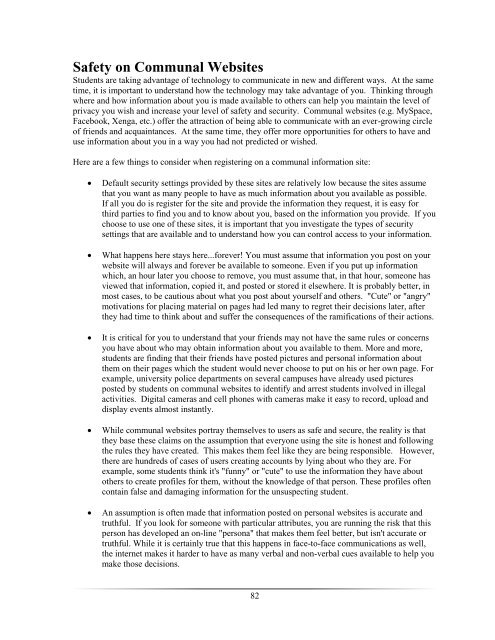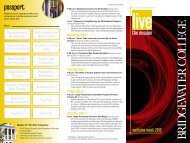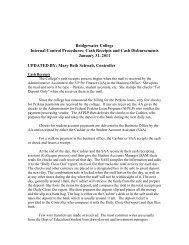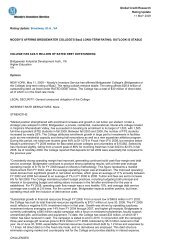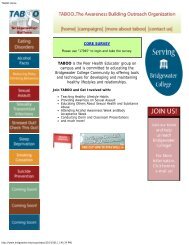Safety on Communal WebsitesStudents are taking advantage of technology to communicate in new and different ways. At the sametime, it is important to understand how the technology may take advantage of you. Thinking throughwhere and how information about you is made available to others can help you maintain the level ofprivacy you wish and increase your level of safety and security. Communal websites (e.g. MySpace,Facebook, Xenga, etc.) offer the attraction of being able to communicate with an ever-growing circleof friends and acquaintances. At the same time, they offer more opportunities for others to have anduse information about you in a way you had not predicted or wished.Here are a few things to consider when registering on a communal information site:Default security settings provided by these sites are relatively low because the sites assumethat you want as many people to have as much information about you available as possible.If all you do is register for the site and provide the information they request, it is easy forthird parties to find you and to know about you, based on the information you provide. If youchoose to use one of these sites, it is important that you investigate the types of securitysettings that are available and to understand how you can control access to your information.What happens here stays here...forever! You must assume that information you post on yourwebsite will always and forever be available to someone. Even if you put up informationwhich, an hour later you choose to remove, you must assume that, in that hour, someone hasviewed that information, copied it, and posted or stored it elsewhere. It is probably better, inmost cases, to be cautious about what you post about yourself and others. "Cute" or "angry"motivations for placing material on pages had led many to regret their decisions later, afterthey had time to think about and suffer the consequences of the ramifications of their actions.It is critical for you to understand that your friends may not have the same rules or concernsyou have about who may obtain information about you available to them. More and more,students are finding that their friends have posted pictures and personal information aboutthem on their pages which the student would never choose to put on his or her own page. Forexample, university police departments on several campuses have already used picturesposted by students on communal websites to identify and arrest students involved in illegalactivities. Digital cameras and cell phones with cameras make it easy to record, upload anddisplay events almost instantly.While communal websites portray themselves to users as safe and secure, the reality is thatthey base these claims on the assumption that everyone using the site is honest and followingthe rules they have created. This makes them feel like they are being responsible. However,there are hundreds of cases of users creating accounts by lying about who they are. Forexample, some students think it's "funny" or "cute" to use the information they have aboutothers to create profiles for them, without the knowledge of that person. <strong>The</strong>se profiles oftencontain false and damaging information for the unsuspecting student.An assumption is often made that information posted on personal websites is accurate andtruthful. If you look for someone with particular attributes, you are running the risk that thisperson has developed an on-line "persona" that makes them feel better, but isn't accurate ortruthful. While it is certainly true that this happens in face-to-face communications as well,the internet makes it harder to have as many verbal and non-verbal cues available to help youmake those decisions.82
Third parties are getting smarter about how to use information contained in these pages.Police departments and university administrators routinely use these pages to detect"problems" among students. <strong>The</strong>se include illegal behavior, threats to others or self,violations of student codes of conduct, etc. In addition, potential employers are now routinelysearching these sites as another way to gather information about the character of potentialemployees. <strong>The</strong>re have already been documented cases of applicants being refusedemployment because of the websites they maintained which show them in a less-thanflatteringlight to employers.(Reprinted with permission from Texas Women‘s University,http://www.twu.edu/osl/counseling/SelfHelp066.html).If the <strong>College</strong> becomes aware of information or material on a student's personal Web space or site(e.g., MySpace, Facebook) which either (1) suggests that a <strong>College</strong> policy may have been violated, or(2) is offensive by general community standards, the <strong>College</strong> will investigate, and appropriate actionwill be taken, which may include revocation of <strong>College</strong> network privileges.Additionally, if a student who represents the <strong>College</strong> (e.g. Student Senate, chorale, intercollegiateathletics) has material posted on his or her personal Web space or site which reflects poorly on thestudent or <strong>Bridgewater</strong> <strong>College</strong>, the student may be suspended from participation in the activity.ResourcesIf you have a specific concern about a communal website, you may contact Campus Police Chief,Nick Picerno at 540-828-5761.For Counseling Resources, contact Randy Hook, Director of Counseling Services at 540-828-5358 orAmy Ghaemmaghami at 540-828-5379.<strong>Bridgewater</strong> <strong>College</strong> Policy on Intellectual Property(Approved by the Executive Committee of the <strong>Bridgewater</strong> <strong>College</strong> Board of Trustees on August 11,2010)1. Policy Statement<strong>The</strong> mission of <strong>Bridgewater</strong> <strong>College</strong> is to educate and develop the whole person. This mission iscarried out in a learning community which encourages a spirit of intellectual inquiry among faculty,students and staff. <strong>The</strong> development of creative and scholarly research, works and inventions, knownbroadly as intellectual property, will be a natural outgrowth of such activities. <strong>The</strong> products of thisscholarship may create rights and interests on behalf of the creator, author, inventor, sponsor and the<strong>College</strong>. <strong>The</strong> purpose of this policy is to support and reward scientific research and scholarship, andhelp faculty, students and staff identify, protect, and administer intellectual property matters anddefine the rights and responsibilities of all involved.2. Applicability<strong>The</strong> policy applies to works created by all classifications of faculty, staff and students of the <strong>College</strong>,and to non-employees such as consultants and independent contractors who create works on behalf ofthe <strong>College</strong>, unless a written agreement exists to the contrary.3. Identification of Intellectual Property83
- Page 1 and 2:
EAGLEHANDBOOK2010-11
- Page 3 and 4:
MISSION STATEMENTThe mission of Bri
- Page 5 and 6:
Payment Information ...............
- Page 8 and 9:
ACADEMICSAcademic AffairsDr. Carol
- Page 10 and 11:
equesting access to their education
- Page 12 and 13:
Study Groups Are available upon req
- Page 14 and 15:
In addition to the attendance polic
- Page 16 and 17:
Withdrawing from the CollegeTo with
- Page 18 and 19:
FINANCIAL MATTERSBusiness OfficeThe
- Page 20 and 21:
STUDENT LIFEDepartment of Student L
- Page 22 and 23:
Counseling ServicesThe Counseling C
- Page 24 and 25:
Services include but are not limite
- Page 26 and 27:
Fall-WinterMen Women Co-RecOpen Bas
- Page 28 and 29:
and campus organizations, weekend a
- Page 30 and 31:
Heritage Hall, erected in 1964, is
- Page 32 and 33:
Residence Life StaffResident Direct
- Page 34 and 35:
Wampler TowersStone VillageA TowerB
- Page 36 and 37:
esidence halls, parking lots, etc.
- Page 38 and 39: not, they will receive a new roomma
- Page 40 and 41: Freshmen will be assigned to rooms
- Page 42 and 43: 2. Any item that appears to be a we
- Page 44 and 45: Tobacco ProductsSmoking and the use
- Page 46 and 47: STUDENT CLUBS, ORGANIZATIONSANDHONO
- Page 48 and 49: Council on Student Affairs appoints
- Page 50 and 51: BRETHREN STUDENT MOVEMENTThe Brethr
- Page 52 and 53: PresidentVice PresidentTreasurerSec
- Page 54 and 55: PresidentFaculty AdvisorAutumn Szew
- Page 56 and 57: communication between the hall and
- Page 58 and 59: Student OrganizationsBRIDGEWATER CO
- Page 60 and 61: ORIENTATION LEADERSThe Orientation
- Page 62 and 63: SYMPHONIC BANDCurrently an ensemble
- Page 64 and 65: Freshman Class SenatorsElected in t
- Page 66 and 67: STUDENT CODE OF ETHICSWe all - stud
- Page 68 and 69: Consent obtained from a person who
- Page 70 and 71: situations, involving large amounts
- Page 72 and 73: SanctionsThe following list of disc
- Page 74 and 75: POLICE AND SAFETYCampus Police and
- Page 76 and 77: Contact information provided by stu
- Page 78 and 79: ATHLETICSIntercollegiate AthleticsT
- Page 80 and 81: Bridgewater College students may bo
- Page 82 and 83: Dinner: 4:30 p.m. - 6:00 p.m.Spring
- Page 84 and 85: Campus Network, Resnet, And Remote
- Page 86 and 87: Do not use the College network to a
- Page 90 and 91: Intellectual Property shall consist
- Page 92 and 93: Vice President and Dean for Academi
- Page 94 and 95: Fines:Overdue charge is $.25 per da
- Page 96 and 97: Pritchett. More than half of the ar
- Page 98 and 99: APPENDIXA. Violation of the Law by
- Page 100 and 101: complaint with the support of appro
- Page 102 and 103: 4. To see to it that the actions of
- Page 104 and 105: The judicial power of the Student B
- Page 106 and 107: ARTICLE VIThis Constitution may be
- Page 108 and 109: HONOR COUNCIL CONSTITUTIONARTICLE I
- Page 110 and 111: Section 2Hearing Procedures and Rul
- Page 112 and 113: The rights and responsibilities of
- Page 114 and 115: Directory of ServicesEmergency:Camp
- Page 116 and 117: CAMPUS MAP110
- Page 118 and 119: Easter Break (begins after last cla
- Page 120 and 121: IID Card ..........................


